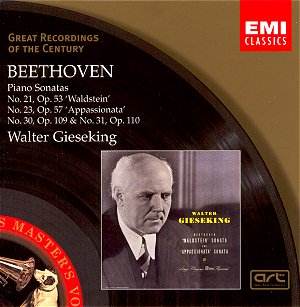Walter Gieseking (1895-1956) is especially remembered
for his interpretations of Ravel and, above all, of Debussy (his celebrated
recordings of that composer’s Préludes have already been reissued
in this series). However, he was also a gifted interpreter of the classical
repertoire and this reminder of his prowess in Beethoven is timely and
welcome.
As Bryce Morrison points out in his excellent accompanying
note, Gieseking recorded 23 of the Beethoven sonatas for HMV and he
suggests that the four collected on this disc are among the best. Gieseking
was never given much to technical practice. He was more of an ‘instinctive’
player (albeit one blessed with a superb technique) and so his performances
contain occasional fluffs or passages of slightly blurred fingerwork.
In my view these matter not one jot. As with Schnabel, though in a very
different style, Gieseking always convinces the listener that he has
penetrated to the heart of the music (as he sees it) and he conveys
his vision marvellously.
Morrison describes Gieseking’s performance of the first
movement of Op. 53 as "fleet and mysterious", a most apt description.
Schnabel (his 1933 recording) is similarly fleet but a touch more forthright
while Brendel (in 1973) is more direct than either. Personally, I’m
just glad there is such a wonderful choice available! In Gieseking’s
hands the slow movement of the ‘Waldstein’ has a wonderfully rapt quality
which just removes the desire to make comparisons. One is under the
spell completely as, in fact, is the case in all the slow movements
on this disc. There is a wonderful poise to the opening of the finale
but Gieseking can call on appropriate reserves of power later in the
movement (is Brendel perhaps a little too broad in this movement?)
The wonderful account of Op. 53 is followed by an equally
fine traversal of Op. 57. The first movement opens with a magical air
of suspense, and if the early downward torrent of notes (track 4, 0’.
35") sounds a little smudged one readily overlooks such tiny blemishes
since the overall conception is so convincing. Another serene, humane
slow movement follows, though I find that Brendel (1970) weights each
chord with much more subtle differentiation. Both have the requisite
fire and passion in the finale. Gieseking’s touch is a little lighter
but that’s his essential style and his approach is no less apt than
Brendel’s.
I also very much enjoyed Gieseking’ performance of
Op. 109. Here, the weight of the argument falls on the third movement,
a theme and six variations. Gieseking handles this movement beautifully,
with superb poise evident, for example, in the simple statement of the
theme. I think his view of this movement is to be preferred to Schnabel’s
(in 1942). Schnabel takes over three minutes longer for this movement.
Overall Gieseking strikes me as being less extreme without sacrificing
any depth.
To complete the set we get Op 110. I‘ve used the word
"poise" several times already in this review and it’s apt
for this performance too. This is not to suggest that strength is absent:
the second movement is delivered with just the right degree of energy.
However, it’s the serenity in the finale which I find particularly satisfying.
The prevailing mood of this movement is an Olympian calm and Gieseking
finds just the right degree of innigkeit. Bryce Morrison rightly
draws attention to the final L’istesso tempo section. Gieseking
makes it fall like a benediction.
Morrison says that Gieseking "tacitly forbids
all comparisons". I know what he means though I’ve dared to make
some. However, the few that I have made do not, I think, find Gieseking
wanting. His is by no means the only way of playing Beethoven but when
one hears it one is persuaded that it’s a very compelling way.
The mono sound is satisfactory though, perhaps inevitably,
there’s some clanging in the piano tone in the upper registers. However,
any sonic limitations do not impede enjoyment of a most distinguished
recital. Strongly recommended.
John Quinn

![]() Walter Gieseking (piano)
Walter Gieseking (piano)
![]() EMI GREAT RECORDINGS
OF THE CENTURY CDM 5 67585 2 0 [79.29]
EMI GREAT RECORDINGS
OF THE CENTURY CDM 5 67585 2 0 [79.29]